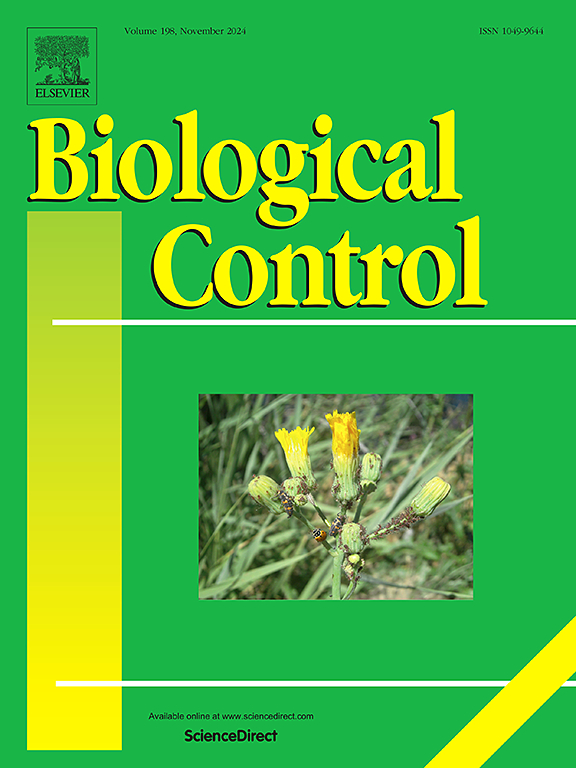Proactive assessment of a native North American egg parasitoid, Anastatus reduvii (Hymenoptera: Eupelmidae), as a potential biological control agent of Lycorma delicatula (Hemiptera: Fulgoridae), in California
IF 3.7
2区 农林科学
Q2 BIOTECHNOLOGY & APPLIED MICROBIOLOGY
引用次数: 0
Abstract
The spotted lanternfly, Lycorma delicatula, native to parts of East Asia and the Indomalayan region, is a polyphagous herbivore poised to become a major global agricultural pest. Since its establishment in the US in 2014, L. delicatula continues to expand its range, and its invasion into California is highly anticipated. Proactive work evaluating Anastatus orientalis, an egg parasitoid of L. delicatula in its native range, as a potential biological agent determined this parasitoid is too polyphagous for release in the US, and no other suitable egg parasitoids have been identified. Consequently, the potential of native North American egg parasitoids to provide biotic resistance to the L. delicatula invasion is being assessed. In a quarantine laboratory study, Anastatus reduvii, an egg parasitoid native to and widespread in North America, including California, parasitized 79% of L. delicatula egg masses with an average egg parasitism rate of 31%. Egg masses exposed to A. reduvii exhibited significantly reduced L. delicatula hatch rates (33%) compared to unexposed control egg masses (90%). These observed rates are comparable to that of A. orientalis attacking L. delicatula egg masses. Rearing A. reduvii from eggs of five different host species did not significantly affect parasitism or L. delicatula mortality, although parasitism was substantially higher compared to previous work using A. reduvii reared exclusively on Pentatomidae eggs. Mass-rearing of A. reduvii is highly feasible and continued investigations into the suitability of this egg parasitoid as a biological control agent for L. delicatula in the US are recommended.
北美原生卵寄生蜂reduvastatus(膜翅目:姬蜂科)在加州作为潜在生物防治剂的初步研究
斑点灯笼蝇,Lycorma delicatula,原产于东亚和印度洋地区的部分地区,是一种多食性食草动物,即将成为全球主要的农业害虫。L. delicatula自2014年在美国成立以来,其活动范围不断扩大,其对加州的入侵备受期待。对原产地区的一种拟卵寄生物——东方阿纳斯塔atus orientalis进行了前瞻性的生物制剂评价,结果表明该拟卵寄生物在美国是多食性的,尚未发现其他适合的拟卵寄生物。因此,正在评估北美原生卵类寄生蜂对美味乳杆菌入侵提供生物抗性的潜力。在一项检疫实验室研究中,一种原产于北美并广泛分布于包括加利福尼亚在内的北美的卵寄生蜂,寄生了79%的乳蝇虫卵,平均寄生率为31%。与未暴露的对照卵(90%)相比,暴露于A. reduvii的卵群孵化率显著降低(33%)。这些观察到的速率与东方棘球绦虫攻击美味乳杆菌卵团的速率相当。用五种不同寄主的卵饲养红曲单胞螨,对寄生率和纤毛虫的死亡率没有显著影响,但寄生率明显高于以往只饲养五角星科虫卵的研究。在美国,大规模饲养reduvii是非常可行的,建议继续研究这种卵寄生蜂作为熟食乳杆菌生物防治剂的适用性。
本文章由计算机程序翻译,如有差异,请以英文原文为准。
求助全文
约1分钟内获得全文
求助全文
来源期刊

Biological Control
生物-昆虫学
CiteScore
7.40
自引率
7.10%
发文量
220
审稿时长
63 days
期刊介绍:
Biological control is an environmentally sound and effective means of reducing or mitigating pests and pest effects through the use of natural enemies. The aim of Biological Control is to promote this science and technology through publication of original research articles and reviews of research and theory. The journal devotes a section to reports on biotechnologies dealing with the elucidation and use of genes or gene products for the enhancement of biological control agents.
The journal encompasses biological control of viral, microbial, nematode, insect, mite, weed, and vertebrate pests in agriculture, aquatic, forest, natural resource, stored product, and urban environments. Biological control of arthropod pests of human and domestic animals is also included. Ecological, molecular, and biotechnological approaches to the understanding of biological control are welcome.
 求助内容:
求助内容: 应助结果提醒方式:
应助结果提醒方式:


